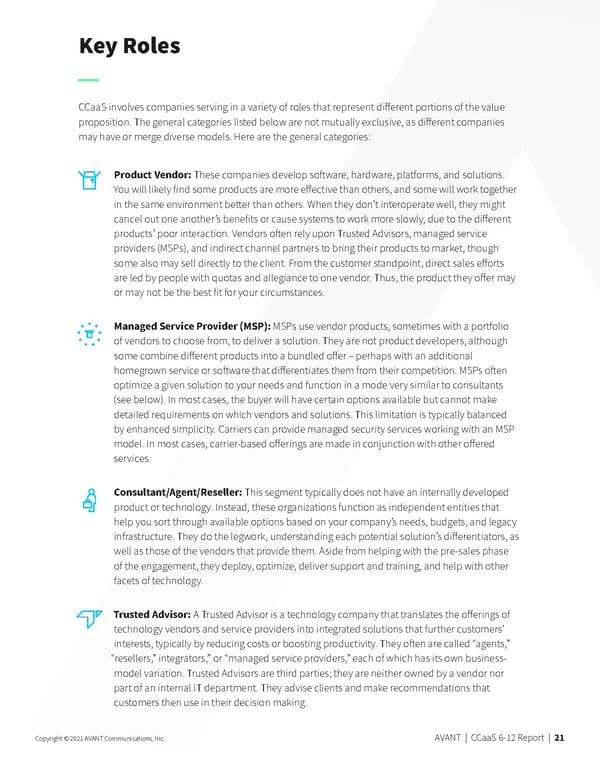Key Roles CCaaS involves companies serving in a variety of roles that represent different portions of the value proposition. The general categories listed below are not mutually exclusive, as different companies may have or merge diverse models. Here are the general categories: Product Vendor: These companies develop software, hardware, platforms, and solutions. You will likely find some products are more effective than others, and some will work together in the same environment better than others. When they don’t interoperate well, they might cancel out one another’s benefits or cause systems to work more slowly, due to the different products’ poor interaction. Vendors often rely upon Trusted Advisors, managed service providers (MSPs), and indirect channel partners to bring their products to market, though some also may sell directly to the client. From the customer standpoint, direct sales efforts are led by people with quotas and allegiance to one vendor. Thus, the product they offer may or may not be the best fit for your circumstances. Managed Service Provider (MSP): MSPs use vendor products, sometimes with a portfolio of vendors to choose from, to deliver a solution. They are not product developers, although some combine different products into a bundled offer – perhaps with an additional homegrown service or software that differentiates them from their competition. MSPs often optimize a given solution to your needs and function in a mode very similar to consultants (see below). In most cases, the buyer will have certain options available but cannot make detailed requirements on which vendors and solutions. This limitation is typically balanced by enhanced simplicity. Carriers can provide managed security services working with an MSP model. In most cases, carrier-based offerings are made in conjunction with other offered services. Consultant/Agent/Reseller: This segment typically does not have an internally developed product or technology. Instead, these organizations function as independent entities that help you sort through available options based on your company’s needs, budgets, and legacy infrastructure. They do the legwork, understanding each potential solution’s differentiators, as well as those of the vendors that provide them. Aside from helping with the pre-sales phase of the engagement, they deploy, optimize, deliver support and training, and help with other facets of technology. Trusted Advisor: A Trusted Advisor is a technology company that translates the offerings of technology vendors and service providers into integrated solutions that further customers’ interests, typically by reducing costs or boosting productivity. They often are called “agents,” “resellers,” integrators,” or “managed service providers,” each of which has its own business- model variation. Trusted Advisors are third parties; they are neither owned by a vendor nor part of an internal IT department. They advise clients and make recommendations that customers then use in their decision making. Copyright © 2021 AVANT Communications, Inc. AVANT | CCaaS 6-12 Report | 21
 CCaaS Report Page 20 Page 22
CCaaS Report Page 20 Page 22